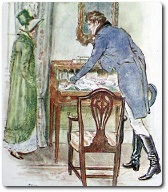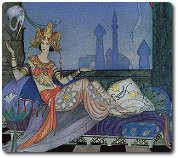Persuasion Contents
Volume 2, Chapter 11 / 23
Synopsis of Volume 2, Chapter 11 / 23
Anne goes to spend the day with the Musgroves. When she arrives she finds that Mrs. Croft, Captain Harville and Captain Wentworth are there. Captain Wentworth is writing a letter and overhears Mrs. Musgrove and Mrs. Croft discussing the inadvisability of long engagements. Captain Harville motions to Anne, she joins him and learns that Captain Wentworth is writing a letter to get a miniature portrait of Captain Benwick, made for  his sister, ready for Louisa. This leads into a conversation about how men and women view constancy differently. Anne finally explains that men can value constancy too, but asserts that women's constancy lasts longer, even when it looks as if there is no hope. Mrs. Croft leaves, Captain Wentworth seals his letter and leaves, only to return to quietly point out to Anne that he has left a letter for her on the desk.
his sister, ready for Louisa. This leads into a conversation about how men and women view constancy differently. Anne finally explains that men can value constancy too, but asserts that women's constancy lasts longer, even when it looks as if there is no hope. Mrs. Croft leaves, Captain Wentworth seals his letter and leaves, only to return to quietly point out to Anne that he has left a letter for her on the desk.
The letter declares Wentworth's love for Anne and his hope of hers for him. He asks for a sign from her that he should keep pursuing her. Anne is overcome with emotion and Charles accompanies her home as it appears to them that she is ill. Captain Wentworth joins them and Charles leaves him to take her home. They find a quieter spot and declare their love for one another. His misunderstandings about Mr. Elliot are cleared up. He confesses his pride led him to flirt with Louisa Musgrove, but that the episode at Lyme showed him that Anne's presence of mind is far more valuable and attractive to him than Louisa's headstrong character. He explains the emotional set-backs he suffered in trying to pursue her again.
Anne is overwhelmed with happiness as she returns home. The evening party begins and she and Captain Wentworth recall the role of persuasion in her initial rejection of him. Anne concludes that she was right to follow Lady Russell's advice out of duty, but hints that the advice was mistaken. Captain Wentworth confesses that his pride prevented him from approaching her again when he had more wealth. He reflects that he is undeserving of the blessing of Anne's enduring love.
Commentary on Volume 2, Chapter 11 / 23
 Mr. Elliot's character, like the Sultaness Scheherazade's head, must live another day The unveiling of Mr. Elliot's true character will be delayed another day, just as the Sultaness in The Arabian Nights delayed her own execution night after night.
Mr. Elliot's character, like the Sultaness Scheherazade's head, must live another day The unveiling of Mr. Elliot's true character will be delayed another day, just as the Sultaness in The Arabian Nights delayed her own execution night after night.
the happiness of such misery, or the misery of such happiness This statement reflects the classical view of love in which two such contrasting emotions can be experienced simultaneously.
settle Marry
to begin without knowing that at such a time there will be means of marrying … I think all parents should prevent as far as they can That a character like Mrs. Croft should express this viewpoint makes us sympathetic to Anne for being similarly prudent. Although Jane Austen endorsed this viewpoint as well, she did not advocate marrying only for money.
The Cape The Cape of Good Hope
set Framed.
We live at home, quiet, confined, and our feelings prey upon us. You are forced on exertion … continual occupation and change soon weaken impressions A statement that reflects the limited freedom of women in that society, as opposed to men whose freedom to pursue a profession and other interests provided a distraction from dwelling on things.
Songs and proverbs, all talk of woman's fickleness Although the notion of women's inconstancy was often upheld in literature, there are many examples to the contrary that Jane Austen undoubtedly knew about.
in a tone of strong feeling … pressing his own with emotion Rather an ironic display of feelings considering what Anne said earlier about women's feelings.
You pierce my soul. I am half agony, half hope The heightened emotional tone is unusual for a Jane Austen hero.
produced an immediate struggle; but after a while she could do no more Anne has managed (largely successfully) to keep her emotions from showing. They have now reached a pitch that is beyond her capability to hide.
She had not mistaken him. Jealousy of Mr. Elliot had been the retarding weight, the doubt, the torment This is the start of a long passage in which we see events and interactions from Captain Wentworth's point of view. This shift is needed for us to understand and be more sympathetic to his emotional journey.
I was hers in honour if she wished it Wentworth and Louisa's careless flirting has led others to believe they will be engaged. Since no proposal has been given, Wentworth could have broken free of the relationship without being too ill-thought of. It is his personal high code of honour that motivates him here.
Anne smiled and let it pass Anne has noticed the discrepancy between the compliment he has just paid her about being unchanged, and his response when he initially saw her that she was so changed he would not have recognised her.
the best corrective of every thing dangerous in such high-wrought felicity That Anne needs to bring her extreme happiness down a notch or two, is an indication of Jane Austen's view that any extreme of emotion is destabilising and unhealthy.
To me, she was in the place of a parent … I was right in submitting to her The societal morality of submitting to the parents' wishes stems from the biblical commandment to honour one's parents (Exodus 20:12). Anne is emphasising that she did her job in following the advice of her mother-figure Lady Russell. Whether her advice was deficient or not was in some ways immaterial.
I have been used to the gratification of believing myself to earn every blessing that I enjoyed … I must learn to brook being happier than I deserve Previously, Captain Wentworth felt that all his rewards in life were justly earned. Now that he has Anne's love, he has a sense of grace that she is an unmerited gift to him.
- At the card party, Anne is surrounded by all the people she's met socially and she gives her opinion of each one. What do you notice about her position within that society here, compared to the start of the novel?
- How does the conversation between Captain Wentworth and Anne about constancy function to bring the plot to its climax?
- What message does the union between Captain Wentworth and Anne send us about the effects of greater social mobility on society at that time?
- English Standard Version
- King James Version
Recently Viewed
Related material
Scan and go
Scan on your mobile for direct link.